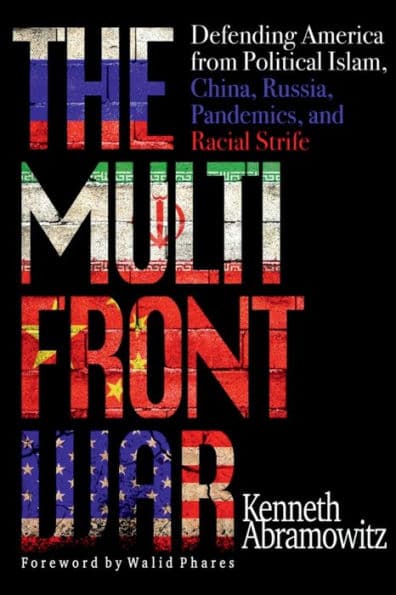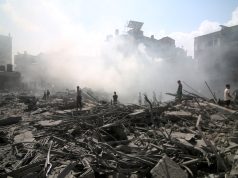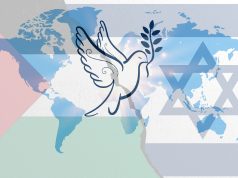.
By Rachel Avraham
At the Negev Summit, US Secretary of State Antony Blinken recently stated that the crisis in Ukraine is having a deadly impact on the Arab world, particularly related to spiraling wheat prices: “This poses grave threats to security in Arab countries.” North African nations are heavily dependent on wheat imports and Blinken earlier said they were facing “disaster” over the massive shock the war dealt to already tight supplies.
Since Russia is a major wheat exporter and is under sanction, and the Ukraine is a major wheat exporter, and is under invasion, this has caused a spike in wheat prices across the Middle East, thus leading to massive inflation and a series of other economic problems worldwide. Indeed, the Arab countries are not the only ones suffering from the recent crisis in the Ukraine.
According to Al Monitor, “Based on annual trade figures by the Ministry of Economy and Industry, Israeli exports of goods and services to Russia amount to $1 billion per year, while imports from Russia come to $2.5 billion. Most of the Russian imports consist of fuel, minerals and gemstones, particularly diamonds. Israel’s major exports to Russia consist of agricultural products (26%), machinery and medical and optical equipment (41%), and chemicals.”
“Half of Israel’s wheat imports originate in Russia, while another 30% come from Ukraine,” Al Monitor noted. “Russia also provides Israel with a significant part of the coal used to power the country’s electrical stations. Israel gets the coal for a relatively low price, too.”
According to Al Monitor, “Israeli trade with Ukraine is significantly less than that with Russia, amounting to under $800 million per year (the 2021 figures are still incomplete). Some 80% of that is imports, especially wheat and other agricultural products.”
At the Jerusalem Post’s London Conference, Governor of the Bank of Israel Amir Yaron did state that the Israeli economy has so far shown resilience despite this: “Inflation is going up everywhere, but in Israel inflation is three and a half percent right now—only slightly above the Bank of Israel’s upper limit. Israel’s inflation is in the bottom 10% of inflation among the OECD. So, it is significantly less.”
However, while the Israeli economy has proven to be resilient to the Ukraine crisis, there has been a massive Aliyah of Ukrainians and Russians to Israel, thus causing stress on the system in Israel. Over 12,000 Ukrainians have fled to the State of Israel since Russia waged war on their country, the Times of Israel reported. According to Dov Lipman of Yad L’Olim, many of these olim do not have proper access to laundry services in the hotels where they are staying and are struggling to get through the Israeli bureaucracy. He claims that the system is understaffed and is not doing enough to help the Ukrainian olim.
Considering the grave humanitarian crisis in the Ukraine, the Israeli government is preparing for a fresh wave of olim in Operation Israel Guarantees. There are still large Jewish communities in the Ukraine and Russia, where many Jews may seek to move to Israel to escape the crushing sanctions on Moscow. Additionally, an estimated 200,000 Ukrainians are considered eligible for Aliyah and some of them have already made the journey. Meet Kateryna, for example.
According to Yad L’Olim, she is 21 years old: “She left her family in Kyiv and after four buses and a train ride—three days with basically no sleep—she arrived at the border. She got onto a flight to Israel and is now here as a new olah. She reached out to Yad l’Olim to help her find a new place to live and employment.” Yad L’Olim is helping her together with many other Ukrainian olim, helping them to get housing, food vouchers, overcome bureaucratic obstacles, and even to provide them with clothing, as many arrived with few belongings. Yad l’Olim also recently organized a visit for the Ukrainian refugee children to a local zoo in Ramat Gan to try to cheer them up.
At the same time, while the massive flow of Ukrainian refugees has strained the Israeli bureaucracy and the war has created obstacles for the recovery of the Israeli economy after the pandemic, US President Joe Biden’s weak response to the crisis in Ukraine, where he merely sanctioned instead of directly intervening to help a NATO ally, has emboldened Iran and ISIS to threaten the State of Israel more. It has also emboldened the “Palestinians” to wage more terror attacks against Israel, as the recent series of terror attacks in Be’ersheva, Hadera and Bnei Brak demonstrate.
Considering this, the crisis in Ukraine has created additional difficulties for the State of Israel during a period in history where enemy activity is already challenging.
Sources:
Bank of Israel Gov: We’ve done very well throughout last two years – The Jerusalem Post
Ukraine war having ‘deadly’ impact on Arab region, says Blinken
 Rachel Avraham is a political analyst working for the Safadi Center for International Diplomacy, Research, Public Relations and Human Rights, which is run by Mendi Safadi, a former Likud Candidate for the Knesset and a former chief of staff of former Israeli Communication Minister Ayoob Kara. Since 2012, she has been working as an Israel-based journalist and writer, covering Iran, Kurdistan, Turkey, Iraq, Syria, the Israeli-Palestinian conflict and other developments in the greater Islamic world.
Rachel Avraham is a political analyst working for the Safadi Center for International Diplomacy, Research, Public Relations and Human Rights, which is run by Mendi Safadi, a former Likud Candidate for the Knesset and a former chief of staff of former Israeli Communication Minister Ayoob Kara. Since 2012, she has been working as an Israel-based journalist and writer, covering Iran, Kurdistan, Turkey, Iraq, Syria, the Israeli-Palestinian conflict and other developments in the greater Islamic world.
Her articles have appeared in the Washington Times, the Hill, Front Page Magazine, the Daily Wire, the Christian Post, the Baltimore Jewish Times, the Jerusalem Post, Israel Hayom, Ahval and many other publications across the globe. She received her MA in Middle Eastern Studies from Ben-Gurion University. She got her BA in Government and Politics with minors in Jewish Studies and Middle Eastern Studies from the University of Maryland at College Park.
Ken`s new book The Multifront War is now available in 190 countries via Amazon and also on BNs in the US. Buy it now!
.
.
.






